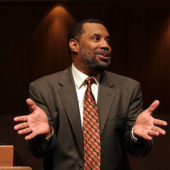As we make the case for life and against abortion, our answers can be confident, compassionate, and persuasive. Or we may fumble — speaking truth, but failing to articulate our convictions and faith persuasively in plain language.
This point played out in cringe-worthy fashion recently during discussion of a bill aimed at restricting abortion for fetal anomaly. Oklahoma H.B. 1549, per the Prenatal Nondiscrimination Act of 2017, would penalize doctors for performing abortions sought because of Down syndrome or other abnormalities. Doctors’ licenses would be at risk and fines levied could range as high as $100,000.
New York Magazine reports that during debate on the bill, Representative Cory Williams (D-Stillwater) pressed George Faught (R-Muskogee) on the fact that the bill has no exception for rape. As the discussion heated up, Williams asked Faught directly whether he believes rape and incest are actually the will of God. Faught replied,
“It’s a great question to ask, and, obviously if it happens in someone’s life, it may not be the best thing that ever happened. But, so you’re saying that God is not sovereign with every activity that happens in someone’s life and can’t use anything and everything in someone’s life, and I disagree with that.”
Later, in damage control mode Faught issued a written statement:
“Life, no matter how it is conceived, is valuable and something to be protected. Let me be clear, God never approves of rape or incest. However, even in the worst circumstances, God can bring beauty from ashes.”
In the aftermath, it’s pretty clear that Rep. Faught is being misquoted and mischaracterized in the press.
“Oklahoma lawmaker defends pregnancy from rape and incest as ‘beauty from ashes’” – Washington Post
“Oklahoma lawmaker defends anti-abortion bill, says rape and incest are ‘will of God’” – New York Times
A lack of a clear apologetics may have opened the door for that to happen. So, while I hope and pray his bill makes it into law, and have no wish to further denigrate someone doing good at the legislative level, Faught’s case can serve as a teachable moment for the rest of us.
The purpose of the bill under discussion was to protect unborn children diagnosed with disabilities, with no exception for unborn children conceived in rape.
Here’s how to defend a proposal to protect children with disabilities while leaving out a rape exception:
First, take the high ground when it comes to love and empathy for parents facing a prenatal diagnosis of fetal anomalies, and for victims of rape. Include concrete examples of bringing justice to bear in prosecuting and punishing rapists, and providing help and support to rape survivors as mandated under the law, and in our culture as well. As Christians we should be seen as the most loving peoople in any discussion. Lead with love and empathy.
Then, draw attention back to the purpose of the proposed law: to protect children as innocent human beings. Neither the presence of a disability nor the circumstances of conception are relevant to assessing the value of the life of a child. Point to examples of children conceived in rape: Jesse Jackson, Ethel Waters, Faith Daniels and many others. Faught’s statement,”Life, no matter how conceived is valuable . . .” is easy to dismiss. Humanize unborn children by calling them what they are. Not merely “life,” but “children,” “human beings,” “the youngest members of the human family.”
Finally, instead of getting drawn into the religion zone, ask if your opponent is willing to ban all abortions except those for rape–which would effectively end 99.7% of abortions being sought today. The abortion advocate will likely balk at the suggestion. Then you can point out that if he or she is in favor of abortion for other reasons they should defend that position with facts and arguments. Making an emotional appeal in light of the hard cases exploits rape victims and is intellectually dishonest.
If pressed directly to answer about God’s will regarding rape, you may say, “We don’t need to know God’s will about rape to determine that it is wrong to intentionally kill an innocent human being, and that is what pre-born children are, even those conceived in rape.” Remind your opponent that the discussion is about protecting innocent children. Offer to take up a discussion about your beliefs and religious doctrine offline. Then press for a return to the central issue.
When defending the pro-life case for life, arguments from science, philosophy, logic and moral reasoning are unassailable. Christians can also confidently say such arguments line up with Scripture. But it is a misstep to lead with a biblical argument or a Bible quote. That too easily allows your opponent to dismiss your argument as “imposing your religion” on others.
Begin working to master making the case for life with a free printable 5 Winning Ways to Argue against Abortion from Cradle My Heart.



















